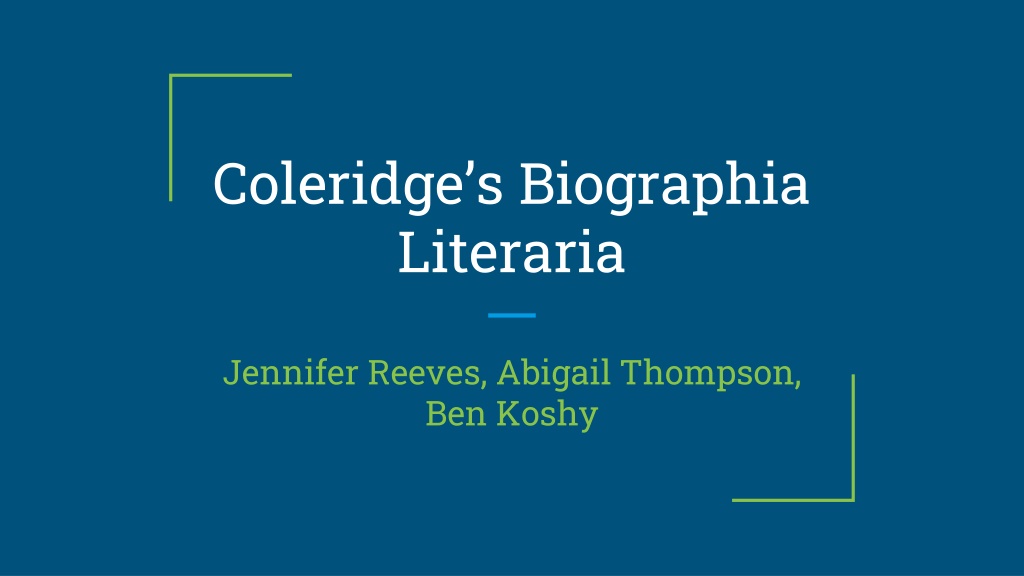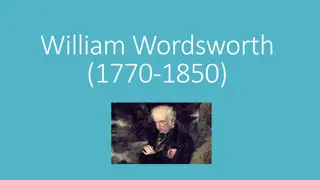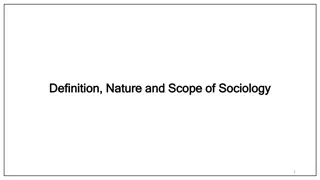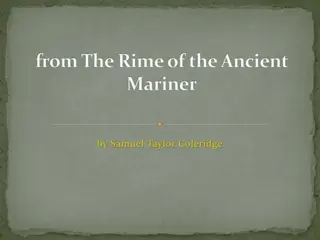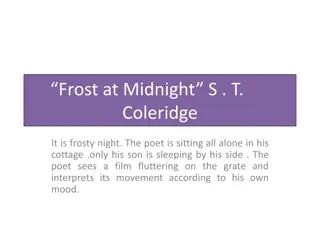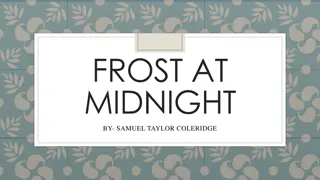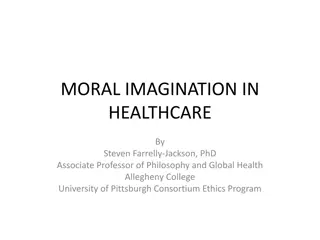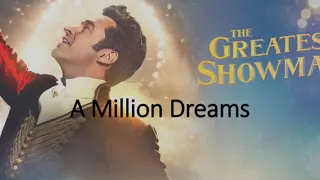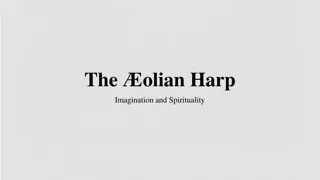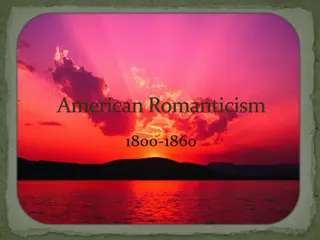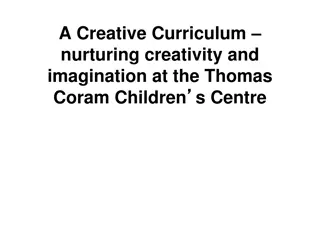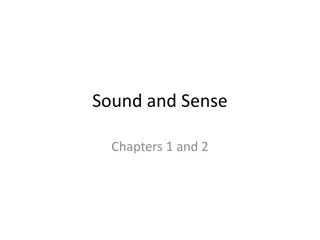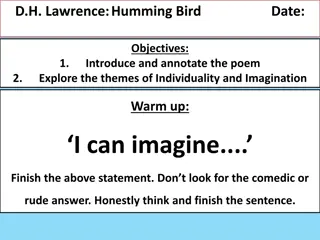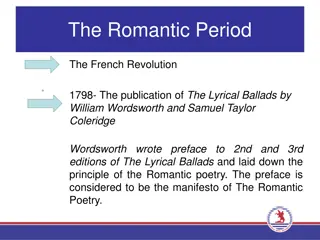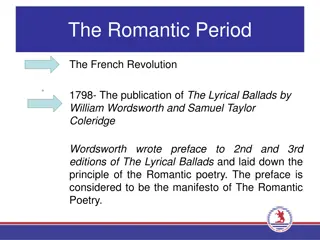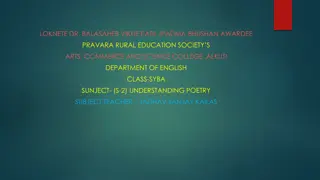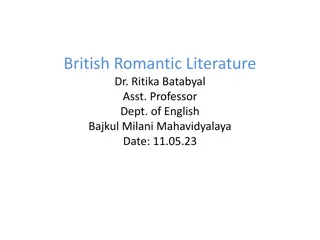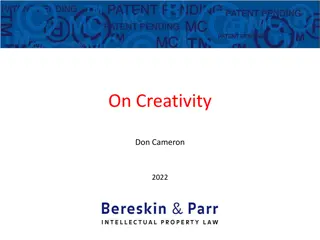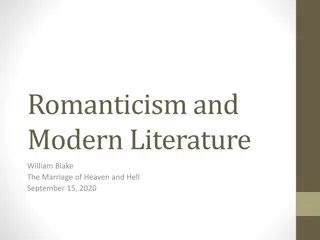Understanding Coleridge's Biographia Literaria Through Imagination and Analysis
Explore Samuel Taylor Coleridge's seminal work "Biographia Literaria" through the lens of imagination and literary analysis. Delve into his perspectives on imagination, fancy, and the nuances of creativity. Uncover the depth of his philosophical views on reality, the supernatural, and the mind's mysterious depths, as well as his distinct religious approach to poetic imagination. Learn about the autobiographical and critical aspects of this work and the unique insights it offers into Coleridge's literary life and opinions.
Download Presentation

Please find below an Image/Link to download the presentation.
The content on the website is provided AS IS for your information and personal use only. It may not be sold, licensed, or shared on other websites without obtaining consent from the author. Download presentation by click this link. If you encounter any issues during the download, it is possible that the publisher has removed the file from their server.
E N D
Presentation Transcript
Coleridges Biographia Literaria Jennifer Reeves, Abigail Thompson, Ben Koshy
Nature of the Item Samuel Taylor Coleridge, Biographia Literaria, or, Biographical sketches of my literary life and opinions (London: Rest Fenner, 1817), first edition. First edition. Volume 1 includes the contemporary ownership inscription of Margaret Scott on the title-page. With a few annotations in the text of both volumes and on the original front free endpaper of volume 1 in an unknown contemporary hand. This is an entirely uncut copy with the half-titles and final publisher ads at the end of volume 2; the volumes have been rebound in quarter calf and marbled boards. It was thought to have been owned by Rev. Alexander John Scott as well. The book contains some of Coleridge s famous thoughts on imagination as well as fancy . The book also contains his use of the willing suspension of disbelief which is a phrase that he coined. The copy does contain inscriptions by its owners which is something researchers can use to learn about its owners.
Biographia Literaria 1817 Autobiographical and philosophical work of literary criticism He recognizes differences between his perspective and Wordsworth s He has a religious view of poetic imagination and an interest in the supernatural and mysterious depths of the mind and cosmos Coleridge believes that there is more to reality than we can see, taste, touch, or measure
Imagination Primary: When the brain intakes images of what s around you and makes it coherent; even to see the world is a creative act; doing what God does on a much smaller scale; involuntary Secondary: You choose to do this; You break down the world you know and you put it back together; making something new that wasn t there before; art, writing; places together things we usually think of as opposites It was a miracle of rare device, A sunny pleasure-dome with caves of ice. Fancy: Mental activity that links and puts things together already in our memory without forming anything new; like memory; not creative; not seeing the world in a new way
Alexander John Scott: Flyleaf Annotation Inscription See Edinburgh Rev. for August for a critique upon this week written by Mr. Jeffrey See also Spirit of the Age by W Hazlitt: p: 61. Considered one of the best articles in that work: One of the earliest and most intimate friends of Mr. Coleridge was the late Sir H. Davy; whose literary talents, as Sir W Scott has observed were almost as remarkable as his wonderful scientific attainments. The following extract from some of Sir Humphry s letter published in his life by Dr. Paris shew that illustrious man s opinion of Mr. Coleridge in so favourable a view that I have given them here verbatim. Oct: 1804: letter to Tho. Poole Esq. p.127: I have rec d [received] a letter from Coleridge within the last 3 weeks: he writes from Malta in good spirits & as usual from the very depths of his being. God bless him: He was intended for a great man: I hope & trust he will at some period appear such.
Alexander John Scott Naval chaplain Loved and knew multiple languages Large library at the end of life Good classicist Sir Humphry Davy Self education included-chemistry, botany, and anatomy needed for part of his profession, included physics and mechanics Declaiming poetry in wild outdoors Also reading Locke and other philosophy
Thoughts? What is the importance of Rev. Scott s interaction with science and natural philosophy?
Margaret Scott Gatty Alexander J. Scott s daughter Born in Burnham Essex 1809 Her father had a large influence on her education and language skills Married Alfred Gatty in 1839 (local curate) Interests: Writing and botany (naturalist) Similar to her father in that regard Wrote didactic fairy tales and science influenced works: Parables in Nature, The Fairy Godmothers, The Poor Incumbent, An Irish Holiday, Proverbs Illustrated, Legendary Tales, The Human Face Divine, History of British Seaweeds
Margaret Scott: p.300 Inscription Pencil line marking a section: O we are querulous creatures! Little less/ than all things can suffice to make us happy:/ And little more than nothing is enough/ to make us wretched From Parables of Nature; Knowledge not the Limit of Belief Bookworm: I do not mean to be rude, I assure you. You are both of you very beautiful creatures, and, I dare say, very useful too. But you should not fancy either that you do know everything, or that you are able to know everything. And, above all, you should not dispute the superiority and powers of another creature merely because you cannot understand them."
